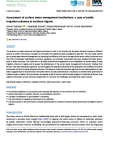Oulmane A., Kechar A., Benmihoub A., Benmehaia M.A. (2022). Assessment of surface water management institutions: a case of public irrigation schemes in northern Algeria. Water Policy, 01/02/2022, vol. 24, n. 2, p. 229-241.
https://doi.org/10.2166/wp.2022.025
https://doi.org/10.2166/wp.2022.025
| Titre : | Assessment of surface water management institutions: a case of public irrigation schemes in northern Algeria (2022) |
| Auteurs : | A. Oulmane ; A. Kechar ; A. Benmihoub ; M.A. Benmehaia |
| Type de document : | Article |
| Dans : | Water Policy (vol. 24, n. 2, February 2022) |
| Article en page(s) : | p. 229-241 |
| Langues : | Anglais |
| Langues du résumé : | Anglais |
| Catégories : |
Catégories principales 07 - ENVIRONNEMENT ; 7.3 - Eau. Gestion de l'EauThésaurus IAMM RESSOURCE EN EAU ; EAU DISPONIBLE ; GESTION DES EAUX ; EFFICIENCE D'UTILISATION DE L'EAU ; EAU D'IRRIGATION ; SECTEUR AGRICOLE ; EAU SUPERFICIELLE ; PERIMETRE IRRIGUE ; IRRIGATION ; INSTITUTION ; ALGERIE ; SERVICE PUBLIC |
| Résumé : | The pressure on water resources that Algeria encounters is due to the scarcity and the water demand increase by different sectors of activity. This induces managers to reconsider the traditional supply management approach. The new water policies aim to adopt water demand management by improving the efficiency of its use in the agricultural sector, which consumes more than 59% of freshwater withdrawals. Economic, regulatory, and voluntary instruments have been adopted for better governance of water resources. This study aims to (i) define institutional arrangements on the exploitation of surface water in large irrigation schemes in Algeria and (ii) assess the effectiveness of the current water management instruments. Findings from farmers’ and water distribution agencies’ surveys suggest that objectives expected by the application of the different economic instruments are far from being achieved. Moreover, the absence of effective executive agencies for the implementation of regulations suggests that an improvement in the performance of public administration is necessary to achieve better governance of irrigation water in Algeria. At the local level, and despite a lack of farmers’ will to formally engage in a collective of farmers, they organize themselves around informal arrangements to overcome the challenges associated with water scarcity. |
| Cote : | En ligne |
| URL / DOI : | https://doi.org/10.2166/wp.2022.025 |







